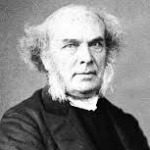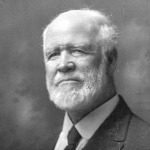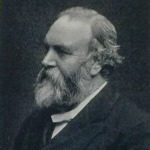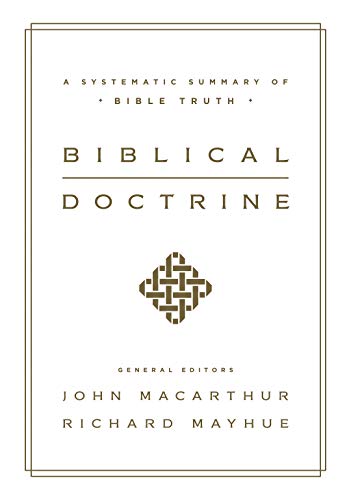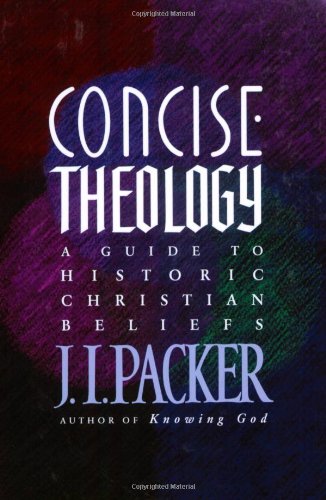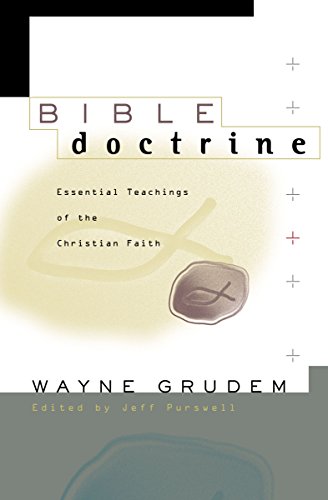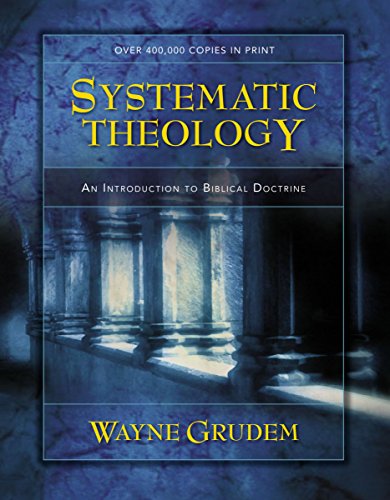Quotes about Doctrine-General
The Savior moved from divine doctrine to dirty feet in a very short space of time. We would do well to remember this.
Encouragement – Oxygen for the Soul, Christian Focus, 1997, p. 14. Used by Permission.
We have come to a place in time where we measure the correctness of our plans simply by their seeming to contribute to our favorite aim. We estimate the soundness of our doctrine, not from its tendency to exalt and glorify God…but entirely by the apparent facility with which it enables us to get sinners to turn from their ways.
The truths that I know best I have learned on my knees. I never know a thing well, till it is burned into my heart by prayer.
Now, in order that true religion may shine upon us, we ought to hold that it must take its beginning from heavenly doctrine and that no one can get even the slightest taste of right and sound doctrine unless he be a pupil of Scripture.
We may judge doctrine and behavior by the objective standards of right and wrong that are given to us in Scripture. What we may not do though, is judge a person’s heart and motives.
The Heart of Discernment by Tim Challies taken from The Discipline of Spiritual Discernment by Tim Challies, copyright 2007, Crossway Books, a division of Good News Publishers, Wheaton Illinois 60187, www.crosswaybooks.org, page 77.
When a doctrine or teaching is presented to me, I may examine it and mull it over. I may compare it to Scripture and seek to understand whether it is consistent with what God has revealed about Himself. But once I accept that doctrine I am responsible for it. If the doctrine is false and I choose to believe it, I can expect God to hold me accountable for believing something that is false.
The Heart of Discernment by Tim Challies taken from The Discipline of Spiritual Discernment by Tim Challies, copyright 2007, Crossway Books, a division of Good News Publishers, Wheaton Illinois 60187, www.crosswaybooks.org, page 80.
Thom Rainer did a study a number of years ago asking formerly unchurched people the open-ended question, “What factors led you to choose this church?” A lot of surveys had been done asking the unchurched what they would like in a church. But this study asked the formerly unchurched why they actually were now in a church. The results were surprising: 11 percent said worship style led them to their church, 25 percent said children’s/youth ministry, and 37 percent said they sensed God’s presence at their church. For 41 percent, someone from the church had witnessed to them, and 49 percent mentioned friendliness as the reason for choosing their church. Can you guess the top two responses? Doctrine and preaching – 88 percent said the doctrine led them to their church, and 90 percent said the preaching led them there, in particular, a pastor who preached with certitude and conviction… When it comes to reaching outsiders, bold, deep, biblical preaching is not the problem. It’s part of the solution.
The Secret to Reaching the Next Generation by Kevin DeYoung taken from Don’t Call it a Comeback, edited by Kevin DeYoung, copyright 2011, Crossway Books, a division of Good News Publishers, Wheaton Illinois 60187, www.crosswaybooks.org, p. 27-28. Get this book!
He that has doctrinal knowledge and speculation only, without affection, never is engaged in the business of religion.
Doctrine is the necessary foundation of duty; if the theory is not correct the practice cannot be right. Tell me what a man believes, and I will tell you what he will do.
We may invigorate our faith and renew our courage by reflecting that divine power has always attended the preaching of doctrine, when done in the true spirit of preaching. Great revivals have accompanied the heroic preaching of the doctrines of grace, predestination, election, and that whole lofty mountain range of doctrines upon which Jehovah sits enthroned, sovereign in grace as in all things else. God honors preaching that honors Him. There is entirely too much milk-sop preaching nowadays, trying to cajole sinners to enter upon a truce with their Maker, quit sinning, and join the church. The situation does not call for a truce, but a surrender. Let us bring out the heavy artillery of heaven, and thunder away at this stuck-up age as Whitefield, Edwards, Spurgeon and Paul did, and there will be many slain of the Lord, raised up to walk in newness of Life.
Obligations of Baptists to Teach Their Principals, Baptist Principles Reset, The Religious Herald Company, 1902.
Doctrine is the framework of life – the skeleton of truth, to be clothed and rounded out by the living grace of a holy life.
We cannot pursue biblical knowledge just to grow in knowledge. Understanding doctrine isn’t the goal. Loving God and living in a way that pleases Him need to be our aims. Knowledge tends to puff us up (1 Cor. 8:1-2), but a genuine relationship with God with a true knowledge of His character and love will keep us humble (Isa. 6:5; Ps. 8:3-4).
We should understand that the subjective depends on the objective. Right emotions depend on, and derive from, sound doctrine.
How Does Hell Glorify God? © 9Marks. Website: www.9Marks.org. Email: [email protected]. Toll Free: (888) 543-1030. Used by Permission.
Those who teach by their doctrine must teach by their life, or else they pull down with one hand what they build up with the other.
Doctrine is not an end to itself. After you’ve learned doctrine, there is always a therefore. Doctrine is inherently practical.
The Word of God tells us that Christ’s church is glorious… [But] today the glory of the church is thickly veiled. It is no exaggeration to assert that in the main it presents a picture of advanced decadence and extreme feebleness… Let it be said emphatically, the church is where the truth is. Sound doctrine always has been, is today, and ever will be the foremost mark of the true church. But who dares to assert that there is today in the churches a rising tide of interest in doctrine? By and large people do not go to church to learn about God from His infallible Word, but to be tranquilized. And that the glory of God is both the beginning and the end of common worship does not seem to occur to them.
Many of us, I think, fear that doctrine will simply become the dead wood of orthodoxy in our church, and so we cut it out whenever we can. In fact, doctrine is the fuel God has given us that, when lit by the fires of grace, burns in a white-hot devotion of Christian worship and discipleship.
Systematic Theology Tools by Michael Lawrence taken from Biblical Theology by Michael Lawrence, copyright 2010, Crossway Books, a division of Good News Publishers, Wheaton Illinois 60187, www.crosswaybooks.org. Page 108.
It’s essential, moreover, to get the doctrine of God right before moving on. Either God will be the center of one’s doctrinal solar system or something else will. What we believe about God determines what we believe about everything.
God – None Like You by Johnathan Leeman, taken from Don’t Call it a Comeback, edited by Kevin DeYoung, copyright 2011, Crossway Books, a division of Good News Publishers, Wheaton Illinois 60187, www.crosswaybooks.org, p. 57.
Christian doctrine serves as the constitution of godly living. Just as the skeleton is to the body or oxygen is to breathing, doctrine proves indispensable to Christianity. Without Christian doctrine, believers would be stripped of truth in living out the faith.
God’s Word by John MacArthur and Richard Mayhue taken from Biblical Doctrine by John MacArthur and Richard Mayhue, copyright 2017, Crossway Books, a division of Good News Publishers, Wheaton Illinois 60187, www.crosswaybooks.org. Page 131.
[Should] the church forsake the standard of sound doctrine? On what basis would false teachers be rejected (Rom. 16:17; 2 John 9–10) or false doctrine be refuted (Titus 1:9)? How would believers know what was true and worth holding on to (1 Tim. 3:9; Rev. 2:24)? How would Christians distinguish between right and wrong? How would sin be confronted and corrected?
God’s Word by John MacArthur and Richard Mayhue taken from Biblical Doctrine by John MacArthur and Richard Mayhue, copyright 2017, Crossway Books, a division of Good News Publishers, Wheaton Illinois 60187, www.crosswaybooks.org. Page 132.
Doctrine matters. What you believe about God, the gospel, the nature of man, and every major truth addressed in Scripture filters down to every area of your life. You and I will never rise above our view of God and our understanding of His Word.
I firmly believe people have hitherto been a great deal too much taken up about doctrine and far too little about practice. The word “doctrine,” as used in the Bible, means teaching of duty, not theory.
Doctrine is only the drawing of the bow; application is hitting the mark.
Christian doctrine is unique in that it is an intellectual response to the historical activity and revelatory disclosure of God. Doctrine is rational reflection upon God’s saving activity in Jesus Christ. Foundational to the idea of “doctrine” is the fact that we need to be told what God is like. It is not ours to determine what kind of God we will believe and obey. It is God’s to determine to show Himself to us. Doctrine is our effort to articulate what He has made known. Doctrine is the divinely authorized attempt to describe God in accordance with how He has revealed Himself in creation, in history, in Jesus Christ and in the Scriptures. In doing so, doctrine also serves to expose false interpretations of reality, false concepts of God. It is the aim of doctrine to make sense of the individual’s and the church’s experience of God as He has made Himself known in Jesus Christ.
Understanding Doctrine: Its Relevance and Purpose for Today, Zondervan, 1990, p. 43. www.zondervan.org.
The pulpit is not to be used to experiment in doctrine. Doctrine should already be settled before it ever reaches the pulpit. The sanctuary should not be a personal theological laboratory, and the people of God used as white mice. This can have profoundly damaging affects as already seen through the history of the church. Men have often used the pulpits to preaching and through doctrines which they have yet to understand, or fully grasp.
One must ever be reminded that to be right on doctrine does not mean one is right with the Lord.
Charismatic Challenge by John Napier, Providence House Publishers, 2003, p. 157. Used by permission. All rights reserved.
And I am afraid there are Calvinists, who, while they account it a proof of their humility that they are willing in words to debase the creature, and to give all the glory of salvation to the Lord, yet know not what manner of spirit they are of. Whatever it be that makes us trust in ourselves that we are comparatively wise or good, so as to treat those with contempt who do not subscribe to our doctrines, or follow our party, is a proof and fruit of a self-righteous spirit. Self-righteousness can feed upon doctrines, as well as upon works; and a man may have the heart of a Pharisee, while his head is stored with orthodox notions of the unworthiness of the creature and the riches of free grace.
If there is a religion in the world which exalts the office of teaching, it is safe to say that it is the religion of Jesus Christ. It has been frequently remarked that in pagan religions the doctrinal element is at a minimum—the chief thing there is the performance of a ritual. But this is precisely where Christianity distinguishes itself from other religions—it does contain doctrine. It comes to men with definite, positive teaching; it claims to be the truth; it bases religion on knowledge, though a knowledge which is only attainable under moral conditions. … A religion divorced from earnest and lofty thought has always, down the whole history of the Church, tended to become weak, jejune and unwholesome; while the intellect, deprived of its rights within religion, has sought its satisfaction without, and developed into godless rationalism.
Gospel doctrine creates a gospel culture. The doctrines of grace create a culture of grace, as Jesus Himself touches us through His truths. Without the doctrines, the culture alone is fragile. Without the culture, the doctrines alone appear pointless. For example: The doctrine of regeneration creates a culture of humility (Ephesians 2:1-9). The doctrine of justification creates a culture of inclusion (Galatians 2:11-16). The doctrine of reconciliation creates a culture of peace (Ephesians 2:14-16). The doctrine of sanctification creates a culture of life (Romans 6:20-23). The doctrine of glorification creates a culture of hope (Romans 5:2). The doctrine of God creates a culture of honesty (1 John 1:5-10). And what could be more basic than that? If we want this culture to thrive, we can’t take doctrinal short cuts. If we want this doctrine to be credible, we can’t disregard the culture. But churches where the doctrine and culture converge bear living witness to the power of Jesus.
No doctrine of the Christian religion is worth preserving which cannot be verified in daily life (John Watson).
A doctrine is what the whole Bible teaches us today about some particular topic. This definition is directly related to…systematic theology, since it shows that a “doctrine” is simply the result of the process of doing systematic theology with regard to one particular topic (Wayne Grudem and Jeff Purswell).
Bible Doctrine: Essential Teachings of the Christian Faith, Zondervan, www.zonderan.com, 1999, p. 20.
We study doctrine until we worship (Abner Chou).
The foundation of true holiness and true Christian worship is the doctrine of the gospel, what we are to believe. So when Christian doctrine is neglected, forsaken, or corrupted, true holiness and worship will also be neglected, forsaken, and corrupted.
Doctrinal preaching certainly bores the hypocrites; but it is only doctrinal preaching that will save Christ’s sheep.
There can be no spiritual help without doctrinal knowledge; but it is equally true that there can be no spiritual help with it, if it is sought for the wrong purpose and valued by the wrong standard.
Taken from Knowing God by JI Packer. Copyright(c) 1973. Used by permission of InterVarsity Press, PO Box 1400, Downers Grove, IL 60515, p.22. Get this book!
There is only one safeguard against error, and that is to be established in the faith; and for that, there has to be prayerful and diligent study, and a receiving with meekness the engrafted Word of God.
The Attributes of God, Baker, p. 22.
Get this book!
Doctrine is useless if it is not accompanied by a holy life. It is worse than useless; it does positive harm. Something of ‘the image of Christ’ must be seen and observed by others in our private life, and habits, and character, and doings.
Inability to distinguish doctrine is spreading far and wide, and so long as the preacher is “clever” and “earnest,” hundreds seem to think it must be all right, and call you dreadfully “narrow and uncharitable” if you hint that he is unsound!
We should no more tolerate false doctrine that we would tolerate sin.
We must ask, Do I fight merely from doctrinal faithfulness? This is like the wife who never sleeps with anybody else but never shows love to her own husband. Is that a sufficient relationship in marriage? No, ten thousand times no. Yet if I am a Christian who speaks and acts for doctrinal faithfulness but do not show love to my divine bridegroom, I am in the same place as such a wife. What God wants from us is not only doctrinal faithfulness, but our love day by day. Not in theory, mind you, but in practice.
Taken from “The Church Before the Watching World” by Frances Schaeffer. Copyright (c) 1971, InterVarsity Christian Fellowship/USA. Used with permission of InterVarsity Press, P.O. Box 1400, Downers Grove, IL 60515, p. 60. www.ivpress.com.
Biblical orthodoxy without compassion is surely the ugliest thing in the world.
For every truth there is a corresponding falsehood. A Christian is known not only by what he believes or affirms, but also by what he rejects and denies.
The Spirit of Revival by Archie Parrish, Introduction, Copyright 2000, Crossway Books, a division of Good News Publishers, Wheaton Illinois 60187, www.crosswaybooks.org. p. 34.
Believing right doctrine will no more save you, than doing good works will save you.
Nothing makes a man so virtuous as belief of the truth. A lying doctrine will soon beget a lying practice. A man cannot have an erroneous belief without by-and-by having an erroneous life. I believe the one thing naturally begets the other.
John Bunyan says that he never forgot the divinity he taught, because it was burnt into him when he was on his knees. That is the way to learn the gospel. If you learn it upon your knees you will never unlearn it. That which “men” teach you, men can unteach you – if I am merely convinced by reason, a better reasoner may deceive me. If I merely hold my doctrinal opinions because they seem “to me” to be correct, I may be led to think differently another day. But if “God” has taught them to me – he who is himself pure truth – I have not learned amiss, but I have so learned that I shall never unlearn, nor shall I forget.
Not all doctrines are equally important. They are equally true, but not all truth is equally important. It isn’t a matter of some doctrines being “more true” than others, as if some doctrines are partially false. It is rather that some doctrines bear less impact than others on our capacity to know, love, and obey God.
Authority and Method in Theology, November 8, 2006, www.enjoyinggodministries.com. Used by Permission.
Doctrine leads to doxology as well as to duty.
Taken from Every Spiritual Blessing in The Message of Ephesians by John R.W. Stott. Copyright(c) 1979 John R. W. Stott. Used by permission of InterVarsity Press, PO Box 1400, Downers Grove, IL 60515, p. 45. http://www.ivpress.com/cgi-ivpress/book.pl/code=9787.
Good conduct arises out of good doctrine.
There is scarcely anything so dull and meaningless as Bible doctrine taught for its own sake. Truth divorced from life is not truth in its biblical sense, but something else and something less.
Unity is not found in uniformity of thought, but in the fellowship of the Spirit, based on sound doctrine which, in turn, is predicated on the clear teaching of Scripture. This is why Paul exhorts us to “mark them which cause divisions and offenses contrary to the doctrine which ye have learned; and avoid them” (Rom 16:17). The false prophets call for unity based not on Scriptural doctrine, but on their [the false prophets] claim for authority. Those who insist on fellowship based on sound doctrine are labeled legalists, while the false prophets are the ones imposing unscriptural demands upon those who follow them.
Media Spotlight Special Report, Latter-Day Prophets: The Restoration of Apostles and Prophets and the Kansas City-Vineyard Connection, September, 1990, p. 14.
There is a direct line that runs from our doctrine to our actions, from what is in our minds to what is in our words and ways… The heart spills over into life. Thoughts of God, and of all else, erupt into acts. The filling of the heart with wise thoughts of God becomes the most important, the most practical, business in the world.
A Vision for Missions, Permission by The Banner of Truth Trust, Carlisle, PA. p. 108-109.
It is an undoubted truth that every doctrine that comes from God, leads to God; and that which doth not tend to promote holiness is not of God.

